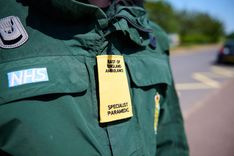Paramedics make a life-saving impact across the east of England
Date: 8 July 2025Paramedics have made a life-changing difference to hundreds of thousands of people across the East of England over the past year, according to new figures released by the East of England Ambulance Service NHS Trust (EEAST) to mark International Paramedics Day.

In the past year, paramedics, pre-hospital practitioners, emergency medical technicians and emergency care assistants have responded to 814,842 face-to-face incidents* – from treating minor injuries to delivering life-saving care during critical emergencies like cardiac arrests.
This year's theme of International Paramedics Day, 'Unity and Community', highlights the diverse and vital roles paramedics play across EEAST – far beyond the traditional image of ambulances and blue lights.
Beyond the ambulance: a broader role in urgent care
Paramedics at EEAST are at the heart of efforts to reduce pressure on hospitals and the wider urgent and emergency care system. When a call to 999 doesn't need an ambulance response, paramedics are part of the team in the Clinical Assessment Service (CAS) which provides expert clinical assessments and advice.
Over the past year, the Clinical Assessment Service has successfully helped 115,173 callers by signposting them to alternative services or advising on self-care.
When patients need care but not an ambulance a team of advanced paramedics in urgent care are often able to assess and treat them safely at home. Over 20,000 patients have been supported by advanced paramedics in urgent care in the last year.
Coordinating community-based care
In the past two years, EEAST paramedics have also played a key role in Unscheduled Care Coordination Hubs (UCCHs). These hubs bring together NHS and community health partners to deliver urgent care in the community and avoid unnecessary hospital admissions.
In the last year alone, these hubs have managed 22,538 999 calls through community partners, without the need for an ambulance response.
Critical care and air ambulance support
For the most serious emergencies, paramedics on EEAST's Critical Care Desk monitor 999 calls in real time to determine whether a critical care resource should be dispatched. These paramedics also serve on air ambulances in partnership with:
- East Anglian Air Ambulance
- Essex & Herts Air Ambulance
- Magpas Air Ambulance
Their frontline experience ensures that critical care is deployed where it can make the greatest difference. They also coordinate with volunteer doctors and paramedics from:
- BASICS Essex Accident Rescue Service
- Bedfordshire & Hertfordshire Emergency Critical Care Scheme (BHECCS)
- Norfolk Accident Rescue Service
- Suffolk Accident Rescue Service
Many EEAST paramedics volunteer with these schemes in their own time, further enhancing patient care across the region.
EEAST also has its own team of advanced paramedics in critical care who are deployed to the most serious of incidents.
Paramedics trained to respond in the most dangerous environments
For the most complex and high-risk incidents across the East of England, EEAST can deploy its Hazardous Area Response Team (HART), a group of highly skilled paramedics trained to operate in some of the most dangerous and challenging environments.
From chemical spills and water rescues to confined space operations, major incidents, and terrorist threats, HART paramedics are equipped with specialist training and equipment to deliver life-saving care where standard ambulance crews cannot safely reach. Their expertise ensures that patients receive critical medical support even in the most hazardous conditions.
Empowering clinical excellence across the East of England
EEAST paramedics play a vital role in shaping the future of the profession. Through the Trust's training and education teams, they deliver a wide range of clinical courses and help coordinate the paramedic degree apprenticeship programme – an internal route that enables aspiring paramedics to qualify while working within EEAST. Paramedics also serve as clinical leads and resuscitation officers across the region, with a focus on upskilling colleagues and continuously improving clinical practice.
They are also involved in patient safety, research, safeguarding, and senior management roles – all striving for excellence.
Supporting local communities
Paramedics also help with the training and coordination of the region's network of Community First Responder (CFR) groups, made up of nearly 1,000 volunteers.
CFRs are trained volunteers who provide life-saving care in their own communities while an ambulance is on the way.
Many EEAST staff are actively involved in local responder groups and are registered as GoodSAM volunteers, ready to respond to cardiac arrests in their communities at a moment’s notice even when they're not on shift.
Simon Chase, Chief Paramedic (Allied Health Professional) & Director of Quality, said: "Every day, paramedics – along with all our clinicians in green – across the East of England demonstrate extraordinary skill, compassion, and resilience. Whether they’re responding to emergencies, supporting patients at home, or working behind the scenes to improve care, their impact is profound.
"On International Paramedics Day, we celebrate not just what they do, but who they are – dedicated professionals who embody unity and community in every aspect of their work. I’m incredibly proud to stand alongside them."
Neill Moloney, Chief Executive of EEAST, said: "On International Paramedics Day, I want to extend my heartfelt thanks to every paramedic across the East of England Ambulance Service and all their colleagues who work alongside them.
"Your dedication, compassion, and professionalism make a profound difference to the lives of thousands of people every day. Whether you're responding to emergencies, supporting patients in their homes, working behind the scenes in our control centres, or collaborating with partners in the community – your contribution is vital and deeply valued.
"Thank you for everything you do to keep our communities safe and cared for."
